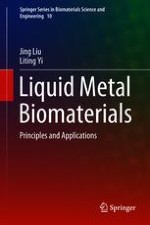2018 | OriginalPaper | Buchkapitel
4. Mechanical Properties of Liquid Metal After Solidified
verfasst von : Jing Liu, Liting Yi
Erschienen in: Liquid Metal Biomaterials
Verlag: Springer Singapore
Aktivieren Sie unsere intelligente Suche, um passende Fachinhalte oder Patente zu finden.
Wählen Sie Textabschnitte aus um mit Künstlicher Intelligenz passenden Patente zu finden. powered by
Markieren Sie Textabschnitte, um KI-gestützt weitere passende Inhalte zu finden. powered by
